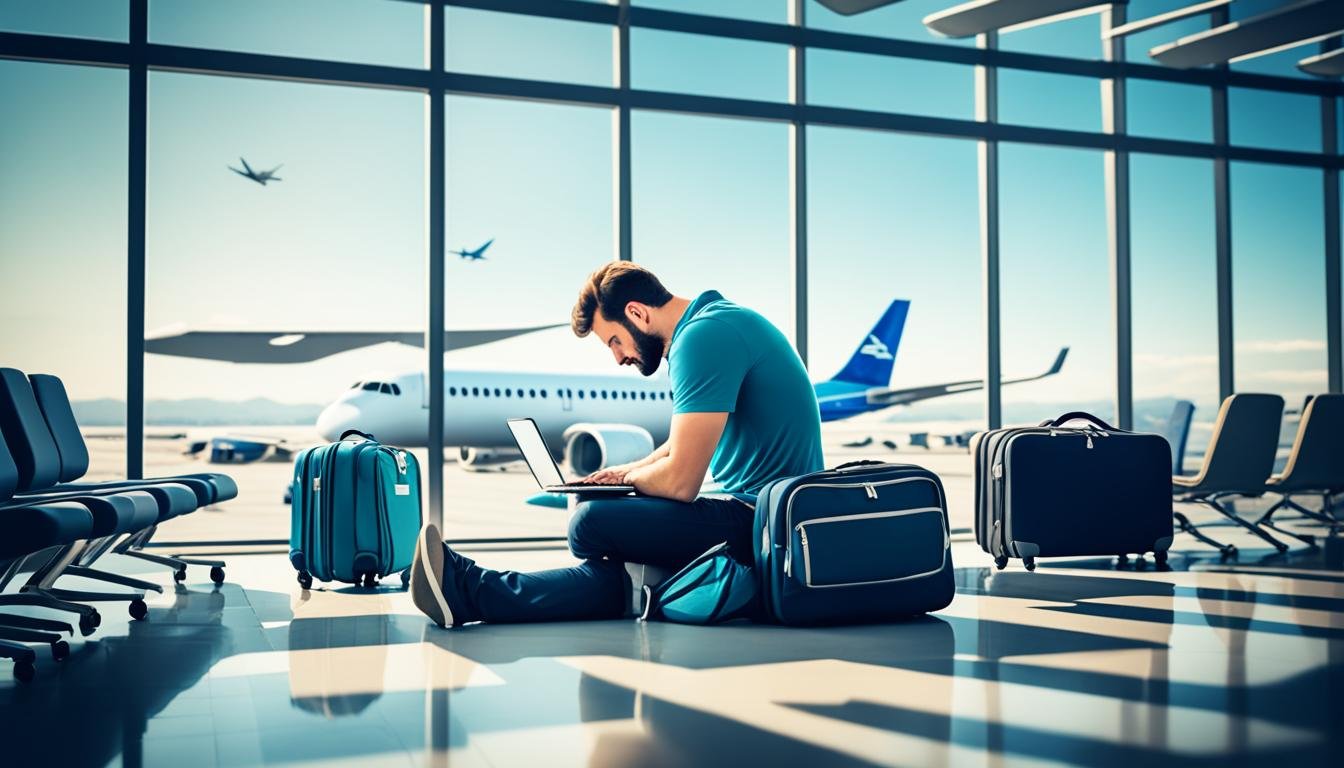Dealing with Travel Fatigue: Tips for Digital Nomads
The life of a digital nomad seems glamorous, full of adventures and beautiful places. But, it comes with challenges that affect both body and mind. Travel fatigue is a big problem for digital nomads, causing tiredness from always moving, not having a fixed home, and keeping relationships long-distance. This guide gives tips to help manage the stress of this lifestyle.
Travel fatigue for digital nomads comes from not having long-term relationships, missing home comforts, and not having a regular living space. It can make you feel as tired as depression does, with pain, sleep issues, stomach problems, and a lack of joy. Saying goodbye often and keeping up a digital life can make these feelings worse, making you feel disconnected from your personal growth.
Knowing these challenges is key to finding balance as a digital nomad. It’s important to take care of yourself by sleeping well, exercising, eating right, and drinking less. Having a place to call home, even if it’s just for a while, can help reduce the stress of always being on the move. It gives you a sense of stability in the changing world of travel.
Key Takeaways
- Travel fatigue affects both the physical and mental health of digital nomads.
- Symptoms include tiredness, aches, poor sleep, digestive issues, and a lack of enthusiasm.
- Reducing travel schedules and focusing on quality experiences can help fight fatigue.
- Having a temporary home can offer stability and lessen travel stress.
- Rest days in your plans are key for a good work-travel balance.
- Self-care like regular exercise, a balanced diet, and good sleep is vital.
- Travel FOMO can lead to exhaustion; focus on well-being over constant travel.
Understanding Travel Fatigue
Travel fatigue is a common issue for digital nomads. It makes them feel tired and less excited about exploring new places. This can really affect their well-being and make the digital nomad life harder.
What is Travel Fatigue?
Travel fatigue is more than just being tired from a long flight or a busy day of sightseeing. It’s a deep feeling of tiredness and disinterest in traveling. It can make you feel like you’re depressed, with symptoms like trouble sleeping and not being able to focus.
Common Causes of Travel Fatigue
There are many reasons why people get travel fatigue. One big reason is the constant change and lack of a steady routine. This can make you feel stressed and disoriented. In fact, 100% of travel content creators say they’ve felt travel fatigue.
Another big cause is the physical strain of always being on the move. 80% of travelers in Vienna said they felt tired from all the walking and bad weather. It’s hard to stay healthy while traveling, and some people gain a lot of weight.
Other factors include the stress of planning trips and making decisions, seeing the same places over and over, and drinking too much. These things can hurt both your body and mind, making the digital nomad life not as great as it seems.
Symptoms to Watch For
Knowing the signs of travel fatigue can help you deal with it. Look out for feeling very tired, having trouble sleeping, and not being able to focus. Many people find that short naps help, and getting enough sleep at night is key.
Some people might feel homesick or sad about saying goodbye often. 75% of travelers say napping helps, and 50% find that good sleep makes a big difference.
Severe symptoms can feel like depression, with feelings of irritation, indecision, negativity, and eating more than usual. It’s important to recognize these signs if you’re a digital nomad. Catching them early can help you take better care of yourself and enjoy your travels more.
With the right awareness and strategies, you can manage and even prevent travel fatigue.
Importance of Maintaining Mental Wellness on the Road
Traveling all the time can really take a toll on your mind. For those living the digital nomad life, it can feel like you’re losing touch with the world. It’s important to understand how travel affects your mind to deal with these feelings.
The Psychological Impact of Constant Travel
Being in new places all the time can be tough. You might feel really alone and struggle to keep work, fun, and taking care of yourself in balance. It’s key to know these feelings to keep your mind healthy while traveling. If you don’t, the excitement of seeing new places can turn into feeling drained.
Recognizing Mental Exhaustion
Knowing when you’re feeling mentally worn out is crucial. Signs include feeling like you’re not doing well, feeling out of touch with others, and finding it hard to feel accomplished. Spotting these signs lets you take steps to help yourself, like slowing down and focusing on self-care. This not only prevents burnout but also keeps your love for adventure alive.
Building a support network, having a purpose while traveling, and staying active are key to good mental health. These actions make the digital nomad life fulfilling and enjoyable, helping you dodge mental burnout on the road.
Setting Realistic Travel Schedules
For digital nomads, making realistic travel plans is key to avoiding burnout and enjoying their trips fully. By focusing on balanced travel plans and long-term advice, they can dodge the health issues that come with constant travel.
Prioritizing Quality Over Quantity
It’s better to choose a few meaningful activities over trying to do everything. This way, you get to enjoy deeper experiences instead of just seeing sights. Making smart travel plans helps you find what truly interests you.
Avoiding Travel FOMO
Digital nomads often worry about missing out, leading to overplanning. To overcome this, it’s important to know what you really want and set limits. Realizing you can’t do everything makes travel more fun and sustainable.
Successful digital nomads know that having a balanced plan, setting achievable goals, and taking breaks are key. These strategies make travel a source of joy, not exhaustion.
Healthy Travel Habits for Digital Nomads
For digital nomads, staying healthy is key. Self-care is vital to boost well-being and productivity. Here are some tips to keep you healthy and full of energy while traveling.
Balanced Diet Tips
Eating well is a big part of staying healthy. It helps keep your energy up and your immune system strong. Cooking your own meals is a great way to control what you eat. You can use apps like HappyCow to find vegan and vegetarian spots around the world.
- Prioritize fresh fruits and vegetables.
- Limit processed foods and sugary snacks.
- Incorporate protein-rich foods like nuts, beans, and lean meats.
Staying Hydrated
Drinking enough water is crucial for travelers. Aim for at least 2 liters a day to prevent dehydration. Tools like the LifeStraw can help by filtering out bad stuff from the water.
- Carry a reusable water bottle.
- Avoid too much caffeine and alcohol, as they can dry you out.
- Use apps like WaterMinder to keep track of your water intake.
Ensuring Quality Sleep
Good sleep is also key for nomads. Moving around a lot can mess with your sleep patterns. Getting enough rest is important. Try using the Calm app for help falling asleep.
- Choose places to stay with comfy beds and quiet rooms.
- Start winding down before bed with activities like reading or meditation.
- Earplugs and sleep masks can help block out noise and light.
By following these healthy habits, you can stay well on the road. Self-care is essential for a happy and productive nomadic life.
Establishing a Base for Longer Stays
For digital nomads, having a base for longer stays boosts well-being. Short stays focus on fun, but longer ones let you settle and find a routine.
Benefits of Having a Temporary Home
Staying in temporary housing for a week or more has many perks. It lets you try out a place and see if it feels right. Digital nomads often use Airbnb and Couchsurfing to live with locals. Having a base means you can get into a steady routine, which is key for your health.
Creating a Comfortable Living Environment
Choosing the right place to live is crucial for digital nomads. Look for quiet areas near nature, good walking spots, and easy coworking access. Reading reviews online helps avoid bad places and scams. Safety and making friends are more important than fancy features.
In the end, having a base as a digital nomad boosts work and gives you a personal space. It helps fight the stress and tiredness from always being on the move.
Incorporating Regular Exercise into Your Routine
For digital nomads, keeping up with exercise is key to staying healthy. Even without a gym or a steady schedule, there are ways to stay fit. Using adaptable workouts and tech, digital nomads can easily fit exercise into their busy lives.
The Importance of Physical Activity
Physical activity is very important. It helps fight the bad effects of sitting too much while traveling. Regular exercise boosts your health and mind, lowering stress and helping you sleep better.
“Approximately 70% of digital nomads find it challenging to prioritize physical activity in their daily routines.”
Flexible workout plans and portable gear can really help. Tools like resistance bands, a jump rope, or apps like MyFitnessPal and Strava are great for tracking your workouts.
Easy Workouts for Travelers
Being flexible is crucial for digital nomads. Here are some simple workouts for travelers:
- Bodyweight Exercises: Push-ups, squats, and lunges need no equipment and can be done anywhere.
- Yoga: It improves mobility, lowers stress, and fits in small spaces.
- Resistance Bands: These are light, portable, and great for strength training.
- Running or Walking: Use fitness trackers or apps to find new paths and stay on track.
Adding these exercises to your regular exercise routine helps digital nomads meet their fitness goals. Plus, joining an online fitness community can give you support and motivation. This helps you stick to your routine, even when you’re in different places.
Dealing with Travel Fatigue: Tips for Digital Nomads
Digital nomads often struggle with travel fatigue. It’s key to know when to take breaks to keep your mind and body healthy. Taking a pause can stop you from getting irritable and tired, making your trip better.
Recognizing When to Take Breaks
It’s important to know the signs of travel fatigue. Over 80% of digital nomads say they’ve felt burnout while traveling. If you’re feeling too much stress, it’s time to slow down.
Try adding ‘nothing days’ to your travel plan. These days are for rest, without any tasks or duties. They help you recover mentally and physically.
More than 55% of digital nomads say slowing down and doing familiar things helps them feel better. Eating well, setting limits, and staying healthy are good ways to fight travel fatigue. Cutting out 10% of unnecessary tasks can also reduce stress and anxiety.
Personal growth and finding new interests are key to beating burnout. About 45% of digital nomads try new activities and hobbies to refresh their journey. Use positive thoughts like “I’ve never been so relaxed” instead of “I’m so busy.” Make time for meditation, deep breathing, and thinking deeply. Embracing the unknown and focusing on what’s important helps over 65% of travelers fight fatigue.
Knowing when to take breaks helps digital nomads have a better, more fun trip. It also boosts their productivity and creativity.
Practicing Self-Care for Travelers
Traveling as a digital nomad can be rewarding but also challenging. It can lead to travel fatigue, financial stress, and complex tax situations. To overcome these challenges, *practicing self-care* is key. It’s important to understand the value of rest and relaxing activities for travelers.
Scheduling “Nothing Days” for Rest
To fight the constant pressure of a nomadic lifestyle, *scheduling rest days* is crucial. These days, known as “nothing days,” help prevent travel burnout. Symptoms like exhaustion, trouble concentrating, and feeling unmotivated mean it’s time to take a break.
Planning days with no activities helps digital nomads recover from travel fatigue. It allows them to truly relax.
- Unplug from technology to refresh your mind.
- Enjoy leisurely walks, which are excellent *relaxing activities for travelers*.
- Read a book, allowing your mind to wander into a different world.
Engaging in Relaxing Activities
Rest days are just one part of the solution. It’s also important to engage in activities that help you unwind and recharge. *Relaxing activities for travelers*, like meditation and deep breathing, can reduce stress and improve well-being.
These activities boost self-awareness and help you stay focused and remember things better. They keep digital nomads productive while enjoying their travels.
- Practice yoga to bolster both physical and mental health.
- Engage in hobbies like sketching or journaling, which are therapeutic and fulfilling.
- Attend local cultural events to immerse yourself and attain a sense of community.
Finding balance is key for digital nomads. Through *practicing self-care*, they can keep up their lifestyle without burning out. Remember, it’s not just about how much you travel. It’s about doing it well, with enough rest and relaxation.
Balancing Remote Work and Travel
For digital nomads, finding the right balance between work and travel is key to avoiding burnout. It’s a delicate balance between keeping up with work and enjoying personal time. Indeed, 73% of digital nomads find it hard to balance work and travel.
It’s important to set clear boundaries, as 65% of digital nomads find it tough to separate work from free time. Being flexible with schedules is crucial, with 82% seeing it as a key to a good work-life balance. Also, 87% use tools to manage their time well, planning work, meetings, and personal activities.
Staying disciplined in a flexible routine is vital, as 79% of digital nomads try to avoid distractions. 68% use a dynamic scheduling approach to work at their best times. And, 81% find prioritizing tasks helps them work more efficiently.
Many remote workers find it hard to fully enjoy their location because they can’t stop thinking about work, with 85% admitting it’s a problem. Time zone differences also make it hard to keep a regular work schedule, affecting 70% of digital nomads. This shows how important good time management is to avoid work issues and stay productive.
Having reliable internet is crucial for 40% of remote workers, showing how important it is for staying connected and getting work done. Also, 55% say portable power stations are a must for keeping in touch and working on the go.
Finally, finding a balance between work and play is key for enjoying both a career and traveling, as 65% of digital nomads believe. By balancing work and travel, digital nomads can lead fulfilling lives and explore the world.
Managing Relationships on the Move
Starting a life as a digital nomad brings freedom and adventure. But, it also makes keeping relationships hard when you’re always moving. Digital nomads must balance new experiences with keeping long-distance connections strong. With the right strategies, it’s possible to keep relationships strong despite the distance.
Maintaining Long-Distance Connections
It’s important to stay connected with loved ones to avoid feeling lonely. Technology is key; regular video chats on Zoom or FaceTime help a lot. These chats offer emotional support and make you feel like you belong, easing the loneliness of travel.
Using social media is also vital for keeping up with friends and family. Posting updates and sharing your adventures keeps them involved in your life. Celebrating important events with video calls or messages also strengthens these ties.
For digital nomads, making friends with others who share similar experiences helps fight loneliness. Joining online groups, forums, and coworking spaces creates a social circle. This circle supports your mental and emotional health.
Source Links
- How to Deal with Travel Fatigue
- For Digital Nomads: The Importance of Resting While on the Road
- Travel Fatigue is Serious! Here’s What to do About it.
- Travel Burnout – What it is and How to Fix It – The Restless Beans
- Travel Fatigue is real and that is okay – Latina Traveler
- The Unspoken Challenges of Living a Nomadic Life
- Maintaining your Emotional wellness while traveling – BecomeNomad
- 15 Digital Nomad Challenges & How to Overcome Them (2024)
- How to Organize Efficiently When You Are a Digital Nomad or a Remote Worker
- 21 Digital Nomad Lifestyle Tips For Travel and Life
- The Ultimate Guide to Staying Fit and Healthy as a Digital Nomad
- Burnout and Digital Nomads – Digital Nomad Adventures
- Accommodation Strategies for Travelers and Digital Nomads – BecomeNomad
- Let’s Talk About Long Term Travel Burnout – Global Goose Travel Blog
- How To Maintain a Healthy Work-Life Balance as a Digital Nomad
- Keep fit keep healthy as a digital nomad: Tips on overcoming hurdles while travelling and working
- Maintaining Your Health and Fitness On The Road As A Remote Worker
- Pre-Vacation Fatigue: Letting Go of Action Overdrive
- Travel burnout and restoring the magic to life on the road – BecomeNomad
- From Burnout to Bliss: 5 Self-Care Strategies Every Digital Nomad Needs
- Digital Nomad Health and Wellness: How to Maintain a Healthy Lifestyle
- Travel Burnout: How to Avoid It as a Digital Nomad
- Balancing Work and Travel as a Digital Nomad – Nomad Veronica
- 9 Tips on How to Work Remote on the Road in 2024
- How I Work Remotely and Travel as a Part Time Digital Nomad
- The Digital Nomad’s Guide to Managing Stress and Preventing Burnout
- How do you manage relationships while living a nomad lifestyle?
- The Pros and Cons of a Digital Nomad Lifestyle – Justyn Jen







